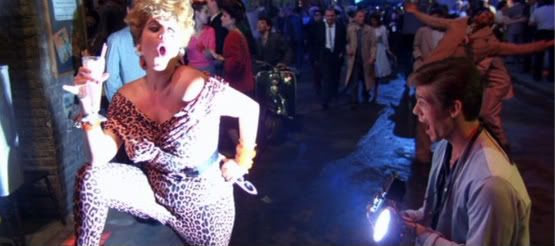 I headline this post with a screencap of Colin snapping a shot of Big Jill for a variety of reasons...most especially, perhaps, because this snapshot evokes the many ways Julien Temple's Absolute Beginners demonstrates the im/possibility of capturing any moment in time. (I also use it to sweeten your indulgence of my admittedly unbaked musings on this remarkable film.)
I headline this post with a screencap of Colin snapping a shot of Big Jill for a variety of reasons...most especially, perhaps, because this snapshot evokes the many ways Julien Temple's Absolute Beginners demonstrates the im/possibility of capturing any moment in time. (I also use it to sweeten your indulgence of my admittedly unbaked musings on this remarkable film.)Absolute Beginners seems in many ways to be "about" the many accidents of generational timing, or the idea that you are who you are in no small part because of where and when you were born. As Temple's film begins, there's no shortage of historical referents, ranging from the scrapbooky imagery of the opening credits to the voiceover that overlays the historical frame (1958 - when the war of our childhood was finally over - when the option of being a teenager came to Britain). There's little doubt the film imagines itself to be "about" the cultural foment immediately prior the legendary Notting Hill riots. Yet, at the same time as such historical context frames our entrance into the cinematic landscape, the film's sonic and visual aesthetics (not to mention its casting and costuming choices) also cue another temporal frame: that of Thatcher's England, the post-modern, post-punk era in which a newly multicultural generation of Britons took the stage.
I happened to screen Absolute Beginners within 24-hours of seeing The Curious Case of Benjamin Button. This accident of timing amplified what I most admire about Absolute Beginners investigation of historical time. Where David Fincher's Benjamin Button (a similarly whimsically epic contemplation of love, loss and the problem of time) endeavors to create the illusion of "accuracy" in its depiction of "past" historical moments, Julien Temple's Absolute Beginners adopts an approach I find more enthralling but struggle to name. Perhaps it's that historical time telescopes in Absolute Beginners so that the past is present as it moves inexorably toward the future? Or maybe it's that each ostensibly separate moment in historical time nests, each within the other, so that there is no present without its being contained by the past? Or might it be the simpler metaphor -- that historical time filters any view of the present (not unlike how the colored gels used by Temple's DP so dramatically filter our view of the action)?
Among the many ideas swirling in this film, I emerged most compelled by Temple's ideas about historical time because, partly, I found the film's telescoping/nesting/filtering to be so productively provocative (in contrast to the stultifyingly contrariwise trajectories of Fincher's Button). More substantially, perhaps, Absolute Beginners is a retro/pomo musical told through various pop styles, with the complex histories of each musical style underscoring each narrative beat of the film. Through thinking about Temple's approach to time, I finally caught a glimpse of why Absolute Beginners was a musical: pop music enlivens the past so that it and the present become contemporary and contemporaries. Few things anchor the accident of generational timing more than pop music and, in Absolute Beginners, Temple used the distinctively retro/pomo aspects of 1980s British pop music to telescope the intergenerational history of Britain's post-WWII transformation. It's a remarkable move, really. Very different than, say, the questions raised by what might be this film's closest cousin, John Waters's Hairspray (1988), and reason enough to warrant this attentive re/visit. Thanks for the challenge.





4 comments:
Fascinating stuff, Brian.
I think the difference between Temple's and Fincher's approach could be defined as the difference between stimulation and simulation. I think Fincher's first few films are attempts at stimulation--expression through expressiveness--that aren't always successful, but starting with Panic Room, they start moving towards simulation--the film as a scientific demonstration. Whereas before he was trying to make conclusions he'd already reached about emotional responses as interesting as possible, now he's interested in simulating a situation and using this re-enactment as the center of a movie. This is the core of Zodiac--analysis through artifice. The Curious Case of Benjamin Button takes it one step further, creating a completely artificial scenario to try and demonstrate how people would react and feel in it. The film has been criticized for sidestepping political and social issues, but, like Zodiac, it's using an unusual social situation to explore emotional responses over a long period of time. It's like a wind tunnel or one of those scale models they use to test how earthquake-safe buildings are.
Thanks, Ignatiy, for your helpful context regarding Fincher's approach to time. I'm still puzzling over Benjamin Button and am glad to be reminded of exactly what I so appreciated about Zodiac as I do.
How do you think Temple's approach to time fits within your idea of "simulation" vs "stimulation"?
I think that Absolute Beginners isn't trying to re-enact and era, he's trying to recreate the feeling of it. It's starting with some ideas and feelings and trying to find equivalents for them, using idioms contemporary to its audience or to its audience's perception of the late 1950s. So '50s movies--or rather, the kind of '50s movies that most people have seen, like musicals--become a reference point but so do, as Chris pointed out in his post, 1980s forms and fashions. Benjamin Button is like someone trying to recapture a feeling by building something--say, trying to recapture the spirit of bygone time by building a castle. Absolute Beginners starts with the feeling, trying to find the modern equivalent of a castle.
Excellent.
Very apt and very helpful.
Post a Comment